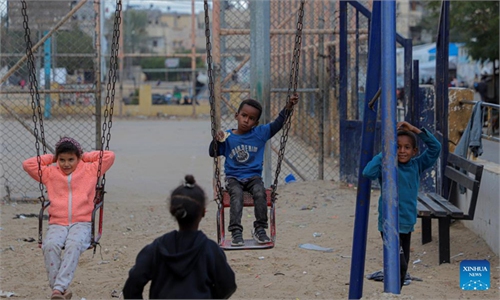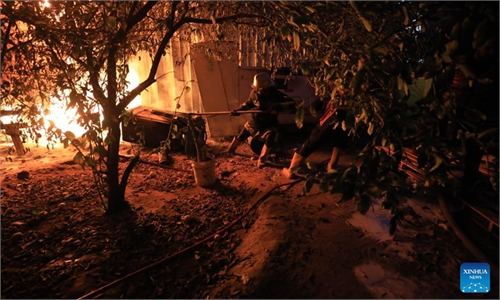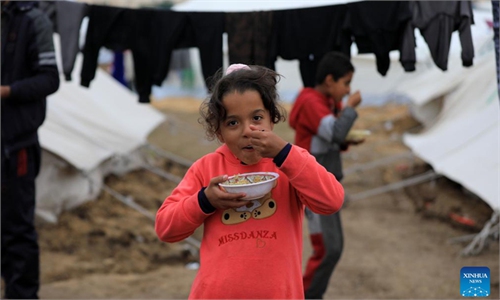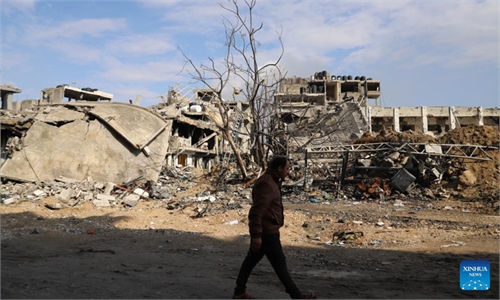Senior Hamas leader’s killing risks escalating conflict, spillover
Cross-border assassination shows Israel has no intention on cease-fire
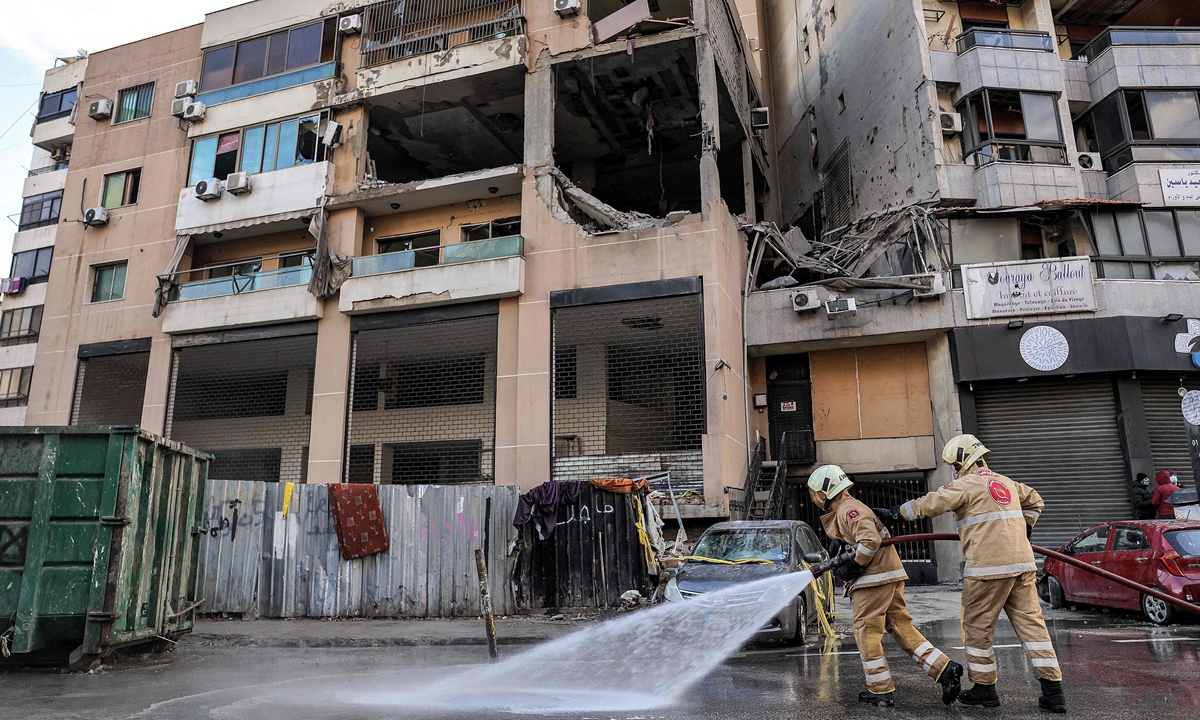
Lebanese civil defense members spray water on the street by the building that was hit by an Israeli strike targeting Hamas deputy leader Saleh al-Aruri in the southern suburb of Beirut on January 3, 2024. Aruri was killed on January 2 along with his bodyguards in a strike by Israel, which has vowed to destroy Hamas after the movement's shock October 7 attacks. Photo: VCG
Chinese analysts said on Wednesday the attack shows that Israel does not care about breaching the borders of other sovereign countries to launch air strikes, and it does not want to negotiate with Hamas for a cease-fire at all. It has also ignored concerns from the US about conflict escalation in the direction of Lebanon.
Israel is looking for a way out of the current conflict but eliminating Hamas in Gaza is extremely difficult, so to eliminate senior Hamas leaders responsible for the October 7 attack could be a feasible plan. Therefore, in the next step, the military operation in Gaza might reduce and attacks that aim to kill Hamas leaders in other countries would increase, said experts.
Conflict escalation
Saleh al-Arouri, the second-in-command of Hamas's political office, was killed in Dahieh, a densely populated stronghold of Hezbollah, the Lebanese militant and political group. A spokesperson for Hezbollah told The Washington Post that the attack involved a drone armed with three rockets, and pinned the blame on Israel.
Hamas announced a freeze on cease-fire negotiations with Israel after Arouri was killed on Tuesday evening, a Palestinian source told the Xinhua News Agency.
"We have informed the brothers in Qatar and Egypt of the freezing of negotiations," the source said on condition of anonymity. Qatar and Egypt have been mediating a cease-fire between Israel and Hamas.
The source also said that Hamas, at war with Israel, rejected any talks about reaching a cease-fire in the Gaza Strip amid escalated Israeli aggression and "assassination schemes" against Palestinian leaders.
Lebanese caretaker Prime Minister Najib Mikati issued a statement late Tuesday condemning the attack, calling it a "new Israeli crime," the Turkish Anadolu Agency reported.
Lebanon intends to file an urgent complaint with the UN Security Council against Israel in light of the attack, the Prime Minister's Office said in a statement. Lebanon has previously lodged several complaints against Israel at the UN Security Council, including cases related to targeting journalists in southern Lebanon and the occupying border towns.
The incident once again proves that Israel and Hamas show no intention, and have no condition, to end their conflict, and even more unfortunately, the US is playing a role in the tolerance for the killings in Gaza, experts said.
Wang Jin, an associate professor at the Institute of Middle Eastern Studies at Northwest University in Xi'an, told the Global Times on Wednesday that "many senior leaders of Hamas are not based in Gaza, but in other countries like Lebanon, Turkey, Jordan, Syria and Qatar. After the attack in Beirut, more similar operations might occur in the region."
Some observers said the US will receive more pressure in the aftermath of the Beirut attack from Arab countries, because the more Washington tolerates Israel continuing its war and uses the US' veto power to stop UN Security Council cease-fire resolutions, the more Arab countries will come under the risk of Israel attacks or assassinations.
Trita Parsi, co-founder and executive vice president of the Quincy Institute for Responsible Statecraft, posted on his X account that the attack in Beirut "shows once more that as time has passed and Biden has refused to push for a cease-fire, we are getting closer and closer to a full war in the region."
Complex situation
The Wall Street Journal on December 23, 2023, reported that US President Joe Biden had urged Israeli Prime Minister Benjamin Netanyahu to halt a preemptive strike against Hezbollah forces in Lebanon days after October 7, warning that such an attack could spark a wider regional war.
The Biden administration does not want to see a regional escalation as it will receive extra pressure and will risk losing control of the Middle East affairs, but it does not mean that Israel would listen. The latest airstrike in Beirut that brought anger from Lebanon proves that Israel just takes action while ignoring concerns from the US, analysts said.
"The attack in Beirut will add more turbulence to the region, but it doesn't necessarily mean Israel is ready to escalate the conflict to Lebanon, and other countries in the region have neither the intention nor condition to get involved in the ongoing conflict between Israel and Hamas," Ma Xiaolin, dean of the Institute for Studies on the Mediterranean Rim at Zhejiang International Studies University, told the Global Times on Wednesday.
For Hamas, in the short term, it might lose its military strength to some extent, but it will maintain its existence in the region as a resistance group with political influence among the public. It is also extremely difficult for Israel to eliminate Hamas in the region, Ma noted.
"A possible and feasible way for Israel to end this conflict is to eliminate a group of senior leaders of Hamas inside and outside Gaza who were related to the October 7 attack, then it would be able to declare 'victory' to its people and end this brutal and costly war," said Wang of Northwest University.
The death toll from Israel's war on Gaza now stands at 22,313 Palestinians, the health ministry in Gaza says. At least 57,296 Palestinians have been wounded, Al Jazeera reported on Wednesday. Thousands more are trapped under the rubble of their homes and are presumed dead.

